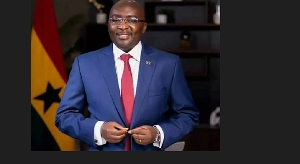- Home - News
- TWI News | TV
- Polls
- Year In Review
- News Archive
- Crime & Punishment
- Politics
- Regional
- Editorial
- Health
- Ghanaians Abroad
- Tabloid
- Africa
- Religion
- Election 2020
- Coronavirus
- News Videos | TV
- Photo Archives
- News Headlines
- Press Release
General News of Thursday, 24 April 2008
Source: GNA
Lack of effective research inputs led to dysfunction of PSI on Cassava Starch-CSIR Boss
Accra, April 24, GNA- Professor Emmanuel Owusu-Bennoah, Director-General of the Council for Scientific and Industrial Research (CSIR) on Thursday said lack of an effective research inputs has led to the dysfunction in some of the Presidential Special Initiatives (PSIs) established. Citing the PSI on Cassava Starch as an example, he said such an initiative needed to have been grounded on the appropriate genetic resource capable of sustaining the profitability of the venture.
Delivering a paper on the topic: " Enhancing the Impact of President's Special Initiatives Through Science, Research and Technology" at the three-day second national forum on Harnessing Research, Science and Technology for the Sustainable Develeopment of Ghana, Prof. Owusu-Bennoah noted that the cassava hybrid used in the industry should have been given higher starch contents than the normal varieties. He explained that unlike the PSI on Oil Palm where the Crop Research Institute (CRI) of CSIR was specifically engaged to supply seedlings to farmers, the research institutions under CSIR did not have any direct role to play in the implementation of the PSI on Cassava Starch.
The Forum under the theme; "Achieving the Millennium Development Goals in Ghana Through the Application of Research, Science Technology and Innovation was attended by research scientists, inventors and academicians. The CSIR Director-General said the variety being used for the programme was low yielding, adding, "Ideally, the CRI should have been tasked to develop a specific variety better suited to the industrial requirements of the PSI and such a variety should have higher starch content, and mature early and with greater yield per unit hectare". He called for an urgent need for higher starch and low cyanide content which may require future Research and Development inputs whilst the operation of the manufacturing plant should have a local scientific capacity to explore possibilities for modification and improvement.
Prof Owusu-Bennoah explained that the PSI on Oil Palm had been a success and the initial production of seedlings locally had saved the nation millions of dollars from the importation of hybrid oil palm seeds and seedlings. "The plantation s development programme initiated at the beginning of the PSI in 2003 yielded 5,549 ha and 15,000 ha in 2005. These have increased 46,213 jobs to the people". He advised that for national development to progress at the pace necessary for the attainment of national vision of middle income status, research and development must be prerequisite whilst the nation energises its innovations system to ensure its role in the socio-economic activities.
Linkages between the centres of knowledge and innovation and the producers of the technologies should be strengthened for the effective implementation of the PSIs and such linkages needed to be conceptualized and ensure a more significant transfer of technology to the end-users. Mrs Mary Chenery-Hesse, President's Special Advisor urged the scientific community to identify what the needs of the country and conduct research into them. She said though PSIs had worthwhile programmes some have experienced challenges, which were being addressed. Mr Kwame Pianim, Chief Executive Officer of New World Investments Limited who spoke on the topic: "Achieving the MDGs in Ghana: The Way Forward," said though some strides had been made, there were more to be done if seriousness and commitment were attached to the activities.










